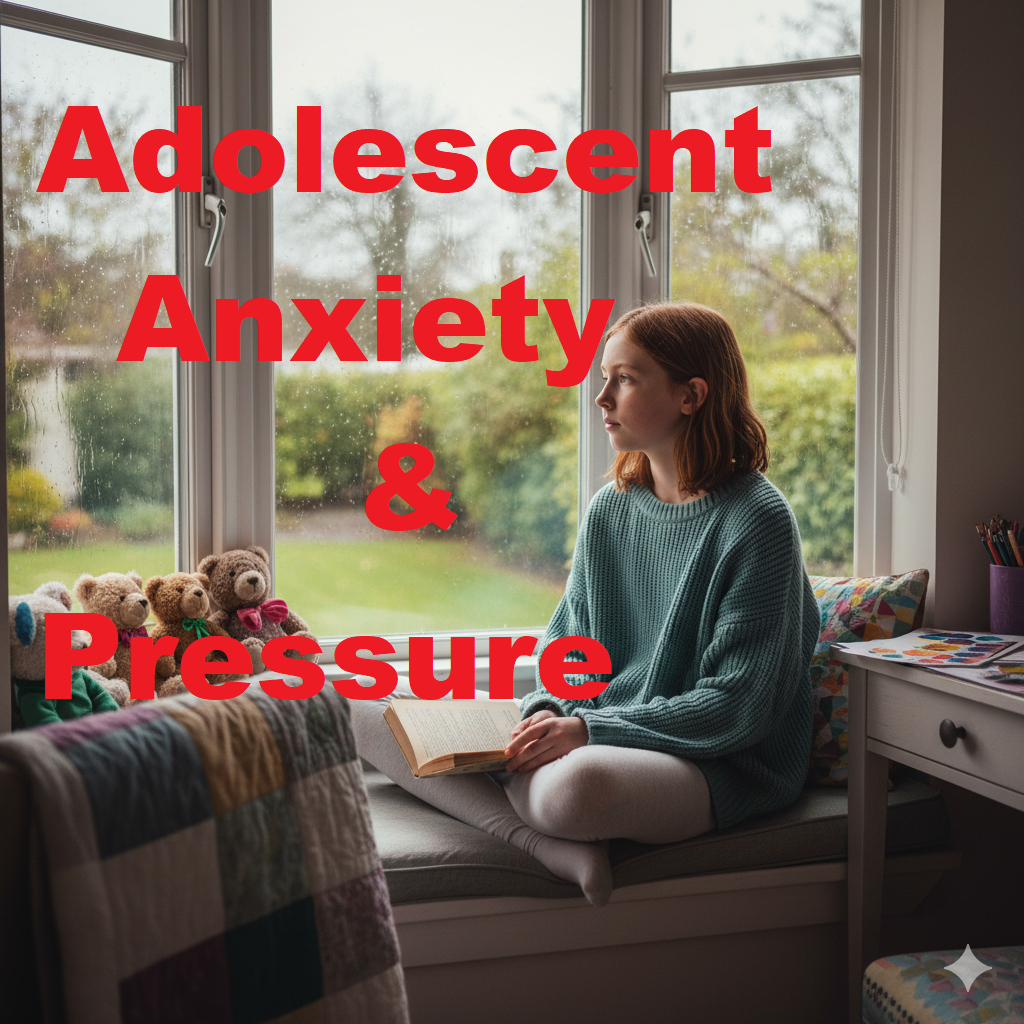Adolescent Anxiety: Parental Pressure and Academic Stress
Adolescent anxiety is becoming a critical psychological issue in the current high-pressure educational system. Adolescent anxiety tends to escalate when students experience high parental pressure to excel academically.
In addition, repeated comparisons, high expectations, and fear of letting parents down tend to heighten emotional suffering among adolescent learners. Consequently, adolescent anxiety not only impacts their mental well-being but also inhibits their focus, drive, and overall performance.
Thus, it is important to understand how academic pressure and parent pressure collectively create this emerging problem and to foster an environment that recognizes effort rather than perfection.
Adolescent Anxiety: Parental Pressure and Academic Stress
Understanding Adolescent Anxiety
It is crucial to understand Adolescent Anxiety in the fast-paced world of today where young minds are subjected to ever-growing emotional and educational
challenges.
As teenagers grow from children into adults, they are exposed to new burdens, social pressures, and identity crises.
Thus, these pressures tend to invoke worry, fear, and self-doubt, which evolve into anxiety.
In addition, competition at school, parental pressures, and peer rivalry contribute to their emotional load, making it more difficult for them to hold on to
mental equilibrium.
Besides, the role of social media and inadequate open communication regarding emotions makes the situation even worse.
Thus, understanding teen anxiety involves a closer examination of their everyday lives, thinking processes, and coping skills.
Through early identification of signs and emotional support, parents, teachers, and school counselors are able to enable adolescents to develop resilience.
Eventually, this knowledge provides a healthier learning climate and allows each student to grow up with confidence and mental well-being.
The Role of Parental Expectations
Parental Expectations is a major influence on the academic and emotional growth of a child.
Parents establish goals and standards early in their children’s lives, which they think will lead them to success.
These expectations, when set too high, tend to create pressure, not motivation.
Thus, teenagers start linking themselves with achievement, resulting in stress and anxiety.
Additionally, relentless comparison with others and fear of not succeeding exacerbate their emotional battles. In most instances, parents mean well by
wanting to foster excellence, but unwittingly, they forget the value of emotional wellness.
Thus, an understanding of the part played by parental expectations is pivotal in ensuring a healthy balance between ambition and compassion.
Through establishing reasonable targets and showing unconditional backing, parents can foster confidence rather than dread.
Finally, positive parenting influences the teenager to become resilient, confident in themselves, and committed to lifelong learning.
Academic Stress and its Psychological Impact
Academic Stress and Its Psychological Impact is now a pressing issue in the lives of students today, as high competition and stringent curricula impose
intense pressure on their psychological and emotional states.
While students grapple with deadlines, high grades, and top examination marks, they end up spending most of their time under stress and exhausted.
As a result, this constant pressure can contribute to anxiety, low self-esteem, and even depression.
Additionally, fear of failure and unrealistic expectations by the individual or their parents intensify psychological distress.
Besides, absence of effective coping and inadequate emotional support from schools or families further enhance the ill effects of academic stress.
Hence, it is necessary to understand its psychological impact in order to create an emotionally supportive learning environment.
Through the implementation of stress-management techniques, mental health awareness, and balanced expectations, parents and teachers can enable
students to attain academic success and emotional strength, achieving a holistic development.
Emotional Consequences of Continuous Pressure
Emotional Impact of Ongoing Pressure heavily impacts adolescents’ mental and social health in the current high-demanding world.
When learners are subjected to constant educational, social, or parental demands, they tend to develop constant stress that slowly erodes their emotional
wellness.
Therefore, anxiety feelings, irritability, and low self-esteem become rampant among young students.
Additionally, ongoing pressure may result in avoidance of social interactions, poor motivation, and inability to focus on assignments.
Moreover, long-term exposure to this stress can cause more severe mental illnesses, such as depression or long-standing anxiety disorders.
Thus, it is imperative for parents, educators, and counselors to know the emotional implications of ongoing pressure so that they can offer appropriate
assistance in time. With early warning signs and healthy coping mechanisms, adults can assist adolescents in coping with stress successfully.
Finally, it decreases excessive pressure, which promotes emotional strength, self-esteem, and general psychological health, allowing students to excel
academically and otherwise.
Five Signs and Symptoms of Anxiety in Adolescents
Excessive Worrying
Teens tend to think excessively about future occurrences or failure, repeatedly considering worst-case situations.
As a result, the continuous worrying impacts their concentration and choice-making.
Restlessness and Irritability
Anxiety tends to keep teens anxious and irritable. Additionally, minor issues may become a source of frustration, leading to fights with friends, teachers, or
relatives.
Physical Symptoms
Anxiety is usually experienced in the form of headaches, stomach pain, fast heart rate, or lethargy.
Moreover, students can have recurrent sleep disturbances, which add to emotional tension.
Avoidance Behavior
Most teenagers attempt to avoid anxiety-causing situations like tests, social interactions, or classroom attendance.
Thus, avoidance becomes a defense mechanism, but it can be an impediment to personal development and academic success.
Difficulty Concentrating
Fear of the future tends to distract an adolescent from concentrating on schoolwork or day-to-day activities.
Consequently, their productivity is lost, and they will find it difficult to hold on to information even with constant effort.
Early identification of the symptoms makes it possible for parents, teachers, and counselors to intervene.
Additionally, relief from anxiety via emotional support and coping measures enables adolescents to be resilient and live in general well-being.
Peer and Social Comparison
Peer and Social Comparison is a strong influence on the cognition, behavior, and self-esteem of teenagers.
When young people interact with their schoolmates and friends, they tend to compare their success, looks, and status with others.
Such comparisons usually produce feelings of inadequacy, jealousy, or low self-esteem. Additionally, during the social media era, being constantly
exposed to filtered pictures and achievement stories amplifies pressure to keep up with peers’ achievements.
Additionally, adolescents who habitually make social comparisons are likely to become more anxious, stressed, and uncertain about themselves, which
have adverse effects on their performance in school as well as emotional well-being.
Hence, being aware of the impact of peer and social comparison is important for parents, teachers, and counselors so they could help adolescents
effectively.
By endorsing self-acceptance, endorsing personal development, and minimizing unhealthy competition, adults can assist adolescents in developing
confidence, resilience, and a good sense of identity.
Role of Schools in Managing Stress
The five major points regarding the Role of Schools in Managing Student Stress:
Creating a Supportive Environment
Schools are able to create a good environment in which students are made to feel safe and valued.
As a result, this lessens anxiety and promotes emotional expression.
Instituting Stress-Management Programs
By adding workshops, mindfulness classes, or counseling sessions, schools proactively instruct students in coping mechanisms.
Additionally, these programs enable students to manage academic and social stress well.
Encouraging Balanced Academic Workload
Schools can track assignments, exams, and deadlines to avoid overload.
Furthermore, they can focus on comprehension rather than mere memorization, which lessens performance-induced stress.
Promoting Extracurricular Activities
Playing sports, being involved in arts and clubs gives students avenues for creativity and relaxation.
Thus, these activities promote emotional strength and general well-being.
Providing Communication and Counseling Access
Schools can offer access to counselors and keep communications channels open with students.
Consequently, students can share concerns, get advice, and learn how to solve problems in a healthy manner.
Effective Communication Between Parents and Children
Five main points on Effective Communication Between Parents and Children:
Active Listening
Parents need to listen carefully to their children without interrupting.
This makes the children feel appreciated and heard, which enhances trust and promotes openness.
Clearly Expressing Emotions
Parents need to demonstrate clearly expressing emotions in a respectful and peaceful manner.
Furthermore, children learn to express their own thoughts and worries effectively when they see clear emotional expression.
Asking Open-Ended Questions
Asking questions that demand more than yes/no responses allows children to share experiences and opinions.
Additionally, this helps develop critical thinking and allows parents to understand the child’s point of view.
Giving Constructive Feedback
Parents must emphasize direction more than criticism.
Thus, constructive feedback assists children in modifying their behavior while preserving self-confidence and minimizing shame or anxiety.
Having Stable and Positive Interaction
Frequent family chats, shared activities, and supportive dialogue provide a stable setting.
Consequently, children are secure and build improved communication, emotional intelligence, and strength of character.
Five Key Coping Strategies For Adolescents
Five Coping Strategies for adolescents are described below:
Practicing Mindfulness and Relaxation Techniques
Adolescents can practice meditation, deep breathing, or yoga to soothe their minds.
As a result of these, stress is minimized, concentration is enhanced, and emotional equilibrium is encouraged.
Participating in Physical Activity
Daily exercise, like sports or spending time outdoors, releases chemicals called endorphins, which naturally subside anxiety.
Additionally, physical activity increases overall well-being and serves as a good venting for tension.
Establishing Healthy Social Support
Healthy relationships with friends, family, and mentors provide adolescents with an outlet to communicate feelings and gain advice.
Additionally, a trustable support system increases resilience in the face of adversity.
Time Management and Goal Setting
By scheduling tasks, organizing duties, and defining achievable objectives, teenagers can decrease a sense of being overwhelmed.
As such, good time management increases productivity while decreasing stress.
Seeking Professional Help When Needed
School counselors, psychologists, or therapists can offer professional help and coping strategies.
Consequently, teenagers can treat anxiety or emotional challenges before problems grow out of control.
Applying these strategies on a regular basis makes stress management possible for teenagers.
Additionally, incorporating emotional, physical, and
professional measures fosters the development of resiliency, self-esteem, and healthy attitudes, backing up both academic achievement and individual
development.
Building a Supportive Home and School Environment
Below are five important points on Creating a Supportive Home and School Environment, described below:
Encouraging Open Communication
Parents and teachers should provide time for adolescents to freely express their feelings and thoughts.
As a result, students feel valued, understood, and more comfortable in sharing concerns.
Facilitating Emotional Awareness
By educating children to identify and control their emotions, families and schools can minimize stress.
Further, emotional awareness enhances coping and enables teens to respond effectively to difficulties.
Balancing School and Extracurricular Activities
Parents and schools should allow students adequate time for hobby, sports, and creative activities.
Further, exposure to a wide range of activities offers relaxation, enhances confidence, and avoids burnout.
Implementing Positive Reinforcement
Acknowledging accomplishments, hard work, and improvement urges motivation and self-esteem.
Hence, positive reinforcement creates a sense of achievement and lessens fear of failure or pressure to perform.
Ensuring a Safe and Inclusive Environment
Schools and homes ought to foster respect, empathy, and cooperation among teens.
Consequently, students build trust, social competence, and a sense of belonging, hence a strong sense of mental well-being.
By utilizing these methods on a regular basis, schools and homes can establish atmospheres conducive to emotional development, resilience, and healthy
living.
And by integrating encouragement, structure, and empathy, adolescents succeed academically, socially, and personally.
Adolescent Anxiety: Parental Pressure and Academic Stress
Conclusion:
Adolescent Anxiety has been an issue of urgency in the lives of current students, with parental expectations and school stress still dictating their
psychological and emotional lives.
Such Adolescent anxiety arises when teenagers work to live up to high standards while juggling demanding coursework, resulting in ongoing stress, self-
doubt, and lowered motivation.
Additionally, being overly centered on performance and grades can push aside personal development, creativity, and emotional strength.
As such, parents and educators must identify the indicators of Adolescent anxiety and address it through proper counseling, support, and adaptive coping
mechanisms.
Additionally, open communication, healthy expectations, and participation in extracurricular activities help decrease stress and enhance confidence.
Above all, these issues are addressed so that teenagers grow with an equilibrium mind, emotional balance, and the capacity to handle future pressures
positively.
Thus, as we reflect upon the demands of parents and schooling on teenagers’ minds, what can we, as society, do to develop settings that actually foster
both attainment and wellness for our teens?






0 Comments